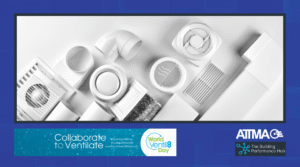
Book Your 2026 Courses Today!
We’re excited to announce that our 2026 course schedule has been released! The Building Performance

Every year on 8th November, the global built environment community celebrates World Ventil8 Day, a campaign dedicated to raising awareness about the vital role of ventilation in creating healthier indoor spaces. This year’s theme, “Collaborate to Ventilate”, calls on professionals and organisations to share innovations, best practices, and partnerships that improve indoor air quality worldwide.
Indoor air quality (IAQ) has been recognised as a public health priority. Poor IAQ is linked to respiratory illnesses, fatigue, and mould growth, while effective ventilation reduces pollutants, allergens, and moisture, creating safer and more comfortable environments. It also supports energy efficiency and sustainability goals by balancing airflow and reducing energy loss.
This year’s focus is on collaboration—bringing together engineers, building managers, researchers, and policy makers to champion ventilation strategies that work. From commissioning systems to meet building regulations to sharing knowledge through training and events, the aim is to ensure ventilation systems perform as intended, not just exist on paper.
World Ventil8 Day isn’t just about awareness; it’s about action. Organisations and individuals can:
The importance of ventilation was highlighted during the COVID-19 pandemic, but its benefits extend far beyond infection control. Good ventilation improves cognitive function, productivity, and overall well-being. As climate challenges and urbanisation increase, ensuring clean indoor air is not optional—it’s essential for health and sustainability.

We’re excited to announce that our 2026 course schedule has been released! The Building Performance

World Ventil8 Day returns on 8th November, spotlighting the vital role of ventilation in creating

A Message from David Pickavance, our Chairman It is with a mixture of gratitude and